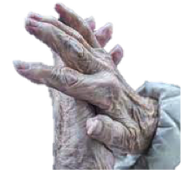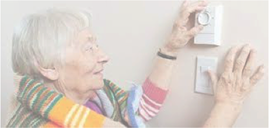 Why are seniors always so cold? Winter may bring sparkling snow and for some, the holidays; but it also brings increased heath issues – especially for seniors. It’s a good idea to know what to look for and expect so that those you care for can stay healthy As people age, their bodies become more sensitive to cold temperatures. This is because of a decrease in the metabolic rate. Ageing bodies are not capable of generating enough heat to help maintain their normal temperature and thinning of the skin is another factor that may contribute to the ‘feeling of cold’ in older adults. The increased sensitivity to cold or feeling cold more than usual, can however, mean that the person is suffering from mild hypothermia. Hypothermia is a condition characterised by extreme low body temperatures. When the temperature of the body falls below 32 degrees, the body becomes so cold it starts to shut down. The National institutes of Health noticed that hypothermia is a less obvious danger for vulnerable adults that requires immediate treatment. Individuals who are older are at an increased risk of hypothermia because their bodies cannot withstand the cold as long as younger people. It’s also true that some medications and illnesses can further heighten this risk. Seniors naturally create less body heat, which means they are often colder than younger individuals to start with. Signs of hypothermia include slowed reactions and movements, sleepiness, slurred or slow speech and confusion. Wearing layered winter gear along with a hat, gloves and warm shoes can do wonders in preventing hypothermia. The home environment temperature should be set to 24 degrees Celsius or higher. Seniors may want to talk to their physicians about any medications or chronic health problems that could increase their risk of hypothermia. Heart troubles worsen According to the National Heart Foundation, seniors who have cardiovascular conditions may experience increased side effects in the cold. Because lower temperatures and winds can reduce body heat, blood vessels tend to constrict, making it more difficult for oxygen to reach the entire body. The NHF recommends that seniors where layered clothing to trap heat and provide insulation. Seniors who are thin are especially at risk of cold-related cardiovascular issues because they do not have as much fat to provide warmth and keep blood flowing.  Chronic pain often flares up It’s common for seniors to have chronic pain like arthritis. When it is cold outside, many people note their symptoms worsen. This can lead to taking excess pain medications, whether prescribed or over the counter. Seniors should talk with their doctor if they find their joints are more painful than usual. Physicians may recommend changing their medication or trying home remedies like Epsom salt baths to relieve the aches. Sleep habits are altered During the winter, the amount of sunshine is typically far less than during the rest of the year. This can make anyone feel sluggish and want to sleep more. Getting extra rest isn’t a problem until sleeping becomes a huge part of the day. Seniors may want to consider setting the alarm to wake up for breakfast and ensure they’re not staying in bed late because of the winter darkness. Keeping a regular schedule can be a big help in avoiding sundowners syndrome, as can opening the blinds and turning on the lights during the daytime. Sundowners syndrome, or sundowning, involves a pattern of sadness, agitation, fear, delusions and hallucinations that occurs in dementia patients in the late afternoon, evening and at night. This increased confusion around twilight can be distressing for both patients and caregivers alike. Falling risks increase Seniors who live in climates that receive snow and ice during the winter are also at an increased likelihood of falling. Those who live at home and do their own shovelling or yard work are especially likely to fall. However even individuals who reside with caregivers and walk with supervision may be at risk. Areas around the home should be shovelled and salted to prevent falls, and they should ask for assistance when required even if it’s just an arm to lean on when walking to the car. The elderly should consider using a walker to help them stay balanced while walking outdoors in the winter. Falling risks also go up indoors during the winter because melted snow on the floor can prove slippery. A senior who has been outside and become very cold may have reduced mobility and balance and can fall while moving indoors. Always check on seniors when the temperature dips or snow and ice are present.  Various factors that contribute to cold sensitivity include:
Medical Conditions contributing to being cold:
Signs of cold sensitivity:
How to keep seniors warm when they are cold:
Awareness and vigilance are important. Feeling cold even in the warm climates is a signal that a person should see a doctor. All the above-mentioned tips should help caregivers keep their loved ones warm. Article from Aged Care NZ Issue 02 2021 Comments are closed.
|
AuthorShonagh O'Hagan Archives
July 2024
|

 RSS Feed
RSS Feed